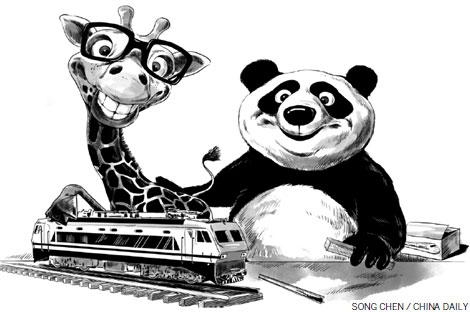

China and Kenya signed a co-financing deal on Sunday to build a railway linking Nairobi to Mombasa, a critical infrastructure project to boost regional trade and deepen integration in East Africa. Chinese Premier Li Keqiang said interconnection in East Africa and in Africa at large will fundamentally boost economic development of African countries. [Special coverage]
Several Chinese media outlets have erroneously reported that Li had talked about building high-speed railways in Africa. The fact is that, in none of the speeches the premier delivered in the four African countries did he say anything about building high-speed railways. He only said that China's railways and airlines planes are of high quality, a research and development center for high-speed railway could be set up in Africa, and China had just started work on an electrified (not high-speed) railway connecting Addis Ababa in Ethiopia and Djibouti.
China, no doubt, has the expertise in high-speed railways, but that doesn't necessarily mean it should build high-speed railways in African countries. Instead, it should concentrate on helping African countries build and operate normal-speed railways.
Railways are a prerequisite for a country's or region's economic development, because a train can carry about 2,000 tons of goods or thousands of passengers in a single trip. Railways are to an economy what blood vessels are to a human body. The Unites States, for example, is not only the world's largest economy, but also has the longest railway network which runs into more than 220,000 kilometers. China's railway network, on the other hand, is more than 100,000 km long, including 20,000 km of high-speed railways.
Another country that has benefited immensely from railways is India, which has about 65,000 km of railways. Many believe that the two most important British legacies that India inherited are an effective democratic system and a comprehensive railway network.
The lack of railways is often cited as an important reason for a country's economic backwardness. Ethiopia, for instance, has only one Addis Ababa-Djibouti railway. Although 681 km of that line runs through Ethiopia, media reports say that almost half of it is no longer in use. The agriculturally rich country produces large amounts of high-quality coffee and oilseeds but finds it hard to transport them from plantations to seaports in neighboring countries like Kenya, Djibouti and Eritrea.
Copyright ©1999-2018
Chinanews.com. All rights reserved.
Reproduction in whole or in part without permission is prohibited.